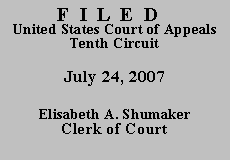

| UNITED STATES OF AMERICA, |
|
| v. | |
| MICHAEL C. PEACH, |
In 1995 Mr. Peach was convicted on two counts of possession with intent to distribute crack cocaine, see 21 U.S.C. § 841(a)(1) (1995), and two counts of use of a firearm in furtherance of a drug-trafficking crime, see 18 U.S.C. § 924(c)(1) (1995). He moved for a new trial. The district court granted his motion on one of the firearms counts, but he was again found guilty on that count. Because he had already been convicted on one count of having violated § 924(c)(1), the court sentenced him to 20 years' imprisonment, to be served consecutively to his sentences on the other counts. We affirmed his convictions and sentences on direct appeal.
On August 24, 1998, Mr. Peach filed a motion for relief under 28 U.S.C. § 2255. Among the grounds asserted for relief, he argued that the district court had improperly enhanced his sentence on the retried count on the basis of a prior § 924(c)(1) conviction because, under our holding in United States v. Abreu, 962 F.2d 1447 (10th Cir. 1992), judgment vacated by United States v. Abreu, 508 U.S. 935 (1993), he did not have a prior § 924(c)(1) conviction. He also argued that he had "suffered ineffective assistance of counsel for not challenging the 924(c) enhancement." R. Doc. 155 at 16. On November 20, 1998, the district court denied his motion. On December 15, 2006, Mr. Peach filed a Rule 60(b) motion to vacate the court's order denying his motion for relief, arguing that the court had failed to address his ineffective-assistance-of-counsel claim. The district court did not rule on the motion, but construed it as a second or successive § 2255 motion and transferred it this court. See 28 U.S.C. § 2255 (requiring second or successive motion to be certified as provided in 28 U.S.C. § 2244); id. § 1631 (authorizing transfer of action to proper court).
We held that Mr. Peach's motion was not a second or successive § 2255 motion but was a true Rule 60(b) motion because it did not challenge the merits of the district court's ruling on his § 2255 motion; rather, it alleged a defect in the § 2255 proceedings. See Peach v. United States, 468 F.3d 1269, 127172 (10th Cir. 2006). Therefore the district court had jurisdiction to consider the motion, and we remanded the case to the district court to rule on it in the first instance. See id. at 1272.
On remand the district court determined that it had, in fact, failed to address Mr. Peach's ineffective-assistance claim in its denial of his § 2255 motion. On the merits, however, it denied relief. It held that counsel had not been ineffective for failure to invoke Abreu, 962 F.2d 1447, because that decision had been overruled by the Supreme Court in Deal v. United States, 508 U.S. 129 (1993), three years before Mr. Peach had been sentenced.
In his pleading before this court Mr. Peach reasserts his contention that his counsel was ineffective for having failed to raise a challenge to the § 924(c)(1) enhancement, and for the first time he argues that his counsel was ineffective for having failed to object to his retrial on the firearms charge.
A COA will issue "only if the applicant has made a substantial showing of the denial of a constitutional right." 28 U.S.C. § 2253(c)(2). This standard requires "a demonstration that . . . includes showing that reasonable jurists could debate whether (or, for that matter, agree that) the petition should have been resolved in a different manner or that the issues presented were adequate to deserve encouragement to proceed further." Slack v. McDaniel, 529 U.S. 473, 484 (2000) (internal quotation marks omitted). In other words, an applicant must show that the district court's resolution of the constitutional claim was either "debatable or wrong." Id.
We can readily dispose of both of Mr. Peach's claims of ineffective assistance of counsel. With respect to the claim relating to the § 924(c)(1) enhancement, no reasonable jurist could debate the district court's denial of the claim. And as to the claim based on failure to challenge the new trial, Mr. Peach did not raise this argument below, so we cannot address it. See Moore v. Gibson, 195 F.3d 1152, 118081 (10th Cir. 1999).
Because Mr. Peach has failed to make a substantial showing of the denial of a constitutional right, we DENY a COA and DISMISS the appeal. We GRANT Mr. Peach's motion to proceed in forma pauperis.
ENTERED FOR THE COURT
Harris L Hartz
Circuit Judge